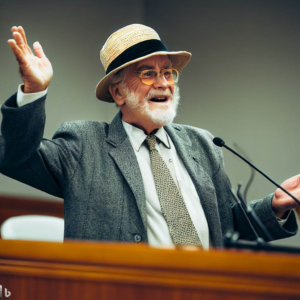Should Florida Citizens have an expectation of privacy? What, if any, are the limits for a code inspector to enter a property for inspection?
The Right to Speak is enshrined in Florida Law so that any person can go to the mic at a public meeting, during the open forum, and say whatever that want in their allotted time…..right? Not Quite!
As July 4th is all around us, we think of those that have fought and of those who are still fighting for our freedoms. Thanks to the sacrifice of our founders, our military, and those that came before, we want to take a moment to briefly review one of the greatest freedoms we have….the collective right to self-govern through citizen participation in the public meeting process.

Public meetings play a vital role in democratic processes, providing a platform for individuals to voice their opinions and contribute to decision-making. In Florida, the prevailing belief among many public speakers at commission and council meetings has been that the right to speak freely is enshrined in state law. However, a closer examination of the laws, particularly Florida Statute §286.0114, and relevant court decisions, reveals a narrower interpretation of this right. Instead, what Floridians truly possess is the right to participate.
The Importance of Public Access:
When in 2015, the City of Boca Raton inquired about the rules required to be in compliance with open meetings law the Florida Attorney General replied:
“Florida’s Government in the Sunshine law requires that meetings of public boards or commissions be open to the public, that reasonable notice of such meetings be given, and that minutes of the meetings be taken. The courts have recognized that for a meeting to be public, the public must be given advanced notice and provided a reasonable opportunity to attend.” (AGO 08/06/2015)
While this may seem straightforward, a deeper examination of the term “reasonable” reveals the narrowing scope of public participation.
The Right to Participate:
In 2003, the Town of Orange Park raised a question regarding the rights of the public to reasonably participate in meetings.
In summary, the Florida Attorney General’s Office responded:
“The courts have recognized the right of members of the public to participate in open meetings and to present their views…however, while the right of a person to attend a meeting subject to statute has been upheld by courts of this state, the courts have not expressly addressed the question of the extent to which a citizen must be allowed to speak. While the importance of public participation in public meetings is recognized, the courts have not set forth any clear standards as to what extent an agency is required to provide for public participation under the Sunshine Law.” It continues that “although not directly considering the Sunshine Law, the federal court in Jones v. Heyman recognized that to deny the presiding officer the authority to regulate irrelevant debate and disruptive behavior at a public meeting would cause such meetings to drag on interminably and deny others the opportunity to voice their opinions. Thus….actions in attempting to confine the speaker to the agenda item….and having the speaker removed when the speak appeared to become disruptive, did not violate the speaker’s First Amendment Rights” (AGO 01/31/2003)
Defining “Reasonable” Standards:
In 2013, the Florida Legislature enacted Florida Statute §286.0114 to address the ambiguity surrounding public participation. This statute empowered local government agencies at all levels to establish their own rules of conduct with some given limitations. One of the major clarifications drafted into the law by legislators was that the public’s right to be heard would be limited to that of a proposition before the board or commission. They further defined the rules and policies that could be adopted:
Under recent court rulings (that will be the subject of a different blog article) local government boards and commissions are not bound to their published agenda, and in many instances can add or subtract items with very little notice. Many local governments have therefore adopted rules and procedures that allow for a period of time where the public can speak to items that may not have been on the agenda as originally noticed.

The Misunderstood Right to Public Comment:
In conclusion, it is essential to dispel the misconception that public comment at meetings represents an unrestricted right. While individuals have the right to participate in public meetings and present their views, this right is subject to reasonable limitations. Local elected bodies have the authority to define rules and procedures, determining the scope and extent of public participation. Therefore, a person does not possess an unrestricted right to speak on any topic of their choosing at a public meeting.
Understanding the nuances of public participation is crucial for individuals engaging in Florida’s public meetings. By being aware of the limitations placed on public comment and respecting the established rules of conduct, citizens can contribute effectively to the decision-making process. It is important to stay informed about local regulations, procedures, and designated periods for public input. Public speakers who know their rights, privileges, and responsibilities will foster meaningful public engagement while ensuring productive and inclusive meetings across the State of Florida.
Reference: AGO INFORMAL Opinion (August 06, 2015)
Reference: AGO INFORMAL Opinion (January 31, 2003)
Disclaimer: This information is being provided for general knowledge purposes. Florida Attorney General Opinions serve to provide legal advice on questions of statutory interpretation. The opinions of the Attorney General, however, are not law; they are advisory only and are not binding in a court of law. The information provided on this website does not, and is not intended to, constitute legal advice; instead, all information, content, and materials available on this site are for general informational purposes only. Readers of this website should contact their attorney to obtain advice with respect to any particular legal matter.
###